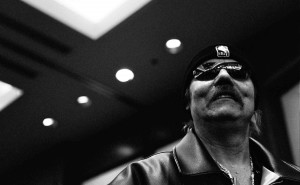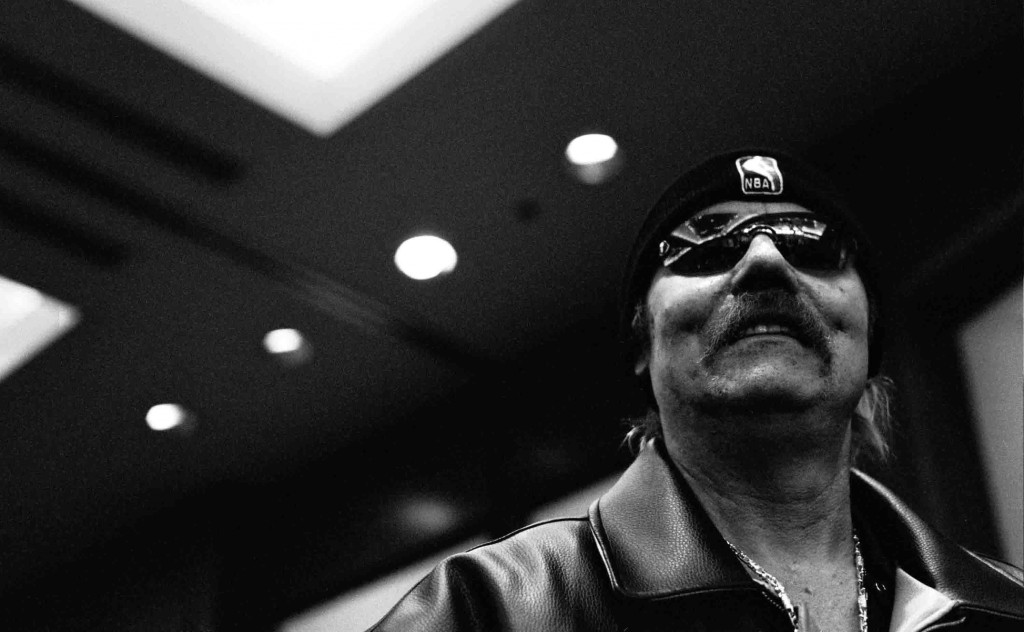Ten-Count for Johnny Bos
By Robert Ecksel on May 12, 2013
 “Boxing is a brutal form of entertainment because nobody gives a fuck about nobody.”
“Boxing is a brutal form of entertainment because nobody gives a fuck about nobody.”
The legendary Johnny Bos, once known as the matchmaker’s matchmaker, passed away today after a long illness. Bos was one of those notorious characters that only the sport of boxing could love. He always told it like it is, sometimes to his detriment, wore his heart on his sleeve, and cared more about the fighters than he cared about the fights.
For those who didn’t know or never saw Johnny, at 6’4” and 235 pounds he was larger than life. With his Fu Manchu moustache, long blond hair, dark shades, pimp threads, swagger and hip-hop ethos, he was unmistakably his own man.
But he also knew as much about the fight game as anyone.
“When I was a kid my father used to watch the fights at home on TV,” Bos told me with a raspy voice when I interviewed him several years ago. “The first fight I went to was the first Patterson-Liston fight on closed-circuit. First fight I saw live was Hurricane Carter versus Luis Rodriguez. I also hung out at the gyms. Bobby Gleason’s when it was on 149th, Harry Wiley’s on 135th, Jimmy Glenn’s Third Meridian on 125th, Cus D’Amato’s gym on 14th Street, Gil Clancy’s Parks Department on 28th Street. That was basically my education. I didn’t go through but nine years of high school. I remember Gil Clancy used to chase me out: ‘It’s not even three o’clock! What the hell are you doing here?’”
Bos was born to be a truant, but for someone who never graduated from high school he seemed pretty darn smart, maybe even too darn smart for his own good.
“Different people get different educations different ways,” Bos said. “The smartest people you’ll ever meet are drug dealers on the streets that have no education at all. But they know what they’re doing, they know business, they know money. They must be running it pretty good because there’s plenty of it around.”
Bos was a wild and crazy kid, and even as an adult he burned the candle at both ends. But he gave up drinking, which was killing him not slowly but fast, and never looked back.
I told Bos that I lost my taste for booze when I was 14. I didn’t embrace sobriety, per se. I just moved on to other things.
“Sunshine!” exclaimed Bos with a smile. “I used to get the clear light and drop it in a bottle of sangria and drink it, and whew! It was a helluva lot nicer. We would snort heroin to come down from the sunshine because there was so much speed in it. But like with LSD, I took that until I had a bad trip and then I stopped.”
Bos first made a name for himself in the 1970s alongside another boxing rebel named Flash Gordon.
“Me and Flash Gordon started Tonight’s Boxing Program‚ which became New York Boxing World. I was writing that up and working in the post office and I believe it was Harold Lederman who called Dennis Rappaport and had him call me to put together a show in January of ‘78. I was 25 then. From there the matchmaking kept growing.”
It was an auspicious beginning to what turned out to be a distinguished career.
“I was a matchmaker for most of the shows in the area,” Bos said. “In those days someone would come in and do a show when they didn’t have their own matchmaker. They’d use a local guy, whoever they were, and fortunately I got chosen for a lot of them. Nowadays every one of these companies has their own matchmakers.
“Matchmaking is not matchmaking anymore. That’s why you don’t have the 10-8 fighters. When they bring in a fighter he’s got to be 14-0 and the guy comes out and he can’t even fight. Now a promoter comes to you and gives you one side of the show and tells you to find an opponent for the rest. That’s not matchmaking.”
I asked Bos if he was alluding to the proverbial meat wagon.
“That’s just what it is. I don’t mind finding them, but fuck, I’m not God. Somebody calls me from Europe and they’re paying enough money and I’m gonna get paid and the fighter’s gonna get paid, that’s a big difference than paying some kid $400 to have his fucking head handed to him, and making a hundred calls to do it.
“What I am really is a personal matchmaker. I handle fighters and I make the matches for them or I okay the matches. Matchmakers are not what they used to be. Managers are not what they used to be. Managers nowadays are just fucking money guys that are going to do whatever the promoter tells them.”
For Bos, the 1980s were the “money years. Europe was flourishing then because of the ‘84 Olympics, and you still had communism. I wish they fucking kept communism,” said the politically incorrect matchmaker. “What happened was once communism stopped that opened up a lot of other countries to professional boxing, and instead of paying the Americans what they wanted, they could go to Russia, they could go to Poland, and get those guys to fight 10 rounds for a thousand dollars—they were starving people—and it dropped the money so much that Americans didn’t want to go to Europe anymore.”
Bos made some scratch during that time. He moved to Florida in 1988, bought a condo and planned on making a fresh start. “But it’s pretty hard to get up and work when you look out the window and see all these girls running around all the time.”
So Johnny Bos returned to the Big Apple.
“Boxing as it is in the United States should be banned,” he said. “Boxing is a brutal form of entertainment because nobody gives a fuck about nobody. The gloves now, even though they’re 10-ounces, have less padding over the knuckles than the six-ounce gloves used to have. That’s why you’re having so many hand injuries. But freaky things happen. Like how many times have you ever heard of a fighter dying in one round? But I’ll tell you something. When fighters do die, it’s usually in states where they give those exams.
“Basically what happens now is the fighters don’t have the respect for the trainers and the managers. They’ve become their own bosses and that’s not good. Some trainers are great in the gym and you put them in the corner and they’re dogshit. Or you got guys who are great cornermen but can’t train anybody. If the fighter tells the trainer he doesn’t want to stop, half the time the trainer ain’t gonna stop it, because he’s scared he’s not going to get paid.”
It’s the same old story, human sacrifice for filthy lucre, but Bos saw some light at the end of the tunnel.
“Instead of putting some idiot from the commission who’s standing in the corner and don’t know what the fuck he’s looking at because they’ve never been in the ring—if they got slapped they’d cry like bitches—get experienced cornermen who are not working that night who know what’s legal and not legal and pay them. And if they think the fight should be stopped, it should be stopped. They have no ties to anybody.”
Bos was a player for years and knew the fight game inside out and upside down. With his knowledge, experience and rarified sensibility, I asked if he has some parting words.
“Here I am dying—I’m 54, but I’m 84, if you know what I mean—but as bad a shape as I’m in, I may outlast the sport.”
Printed with permission from Boxing.Com
